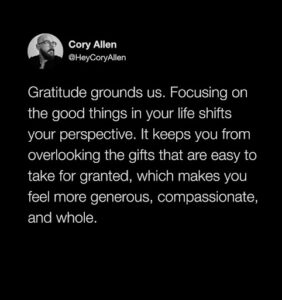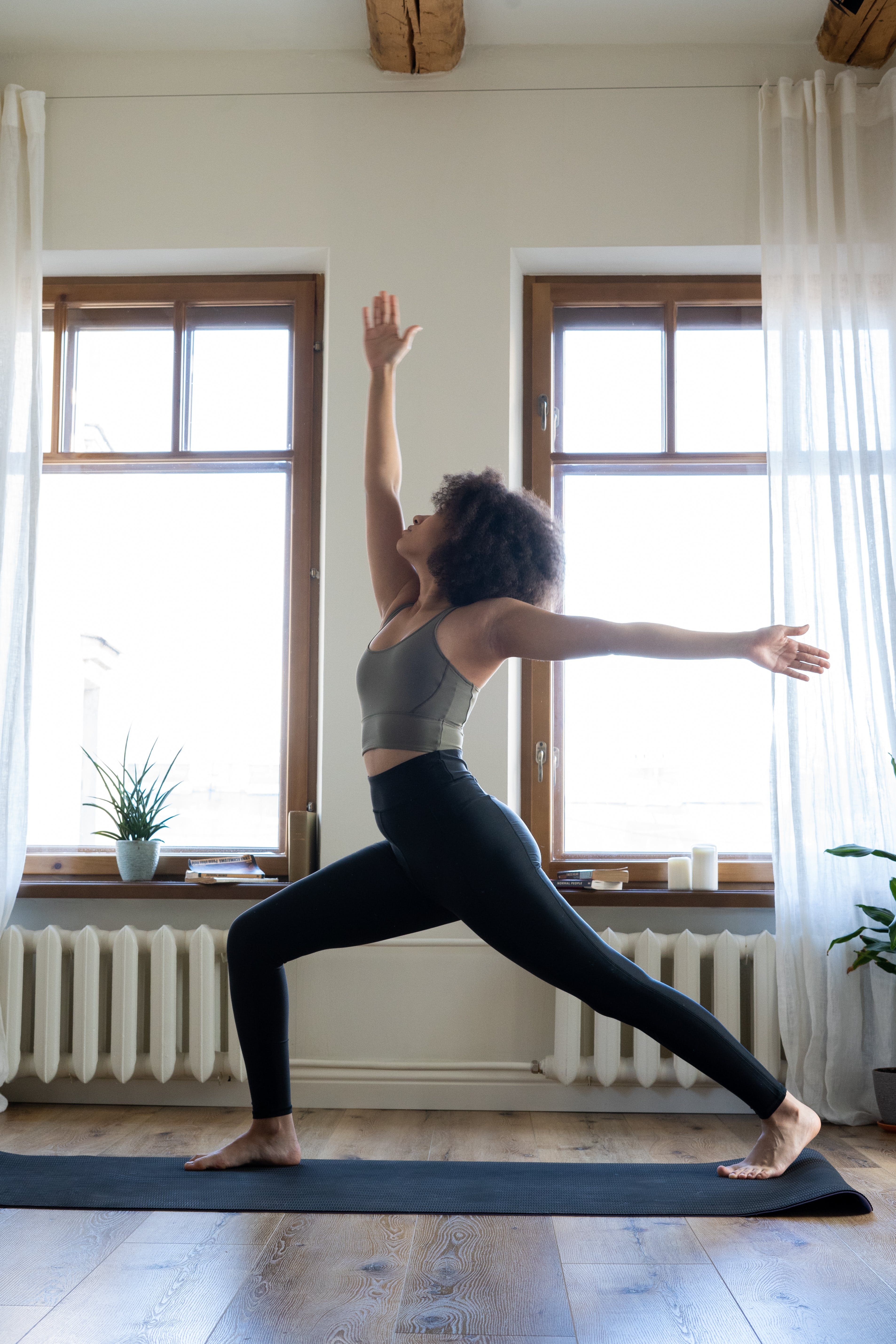I’ve always compared depression to a fog that causes you to dwell on the past and what’s to come. The mist makes you feel overwhelmed, lost, alone, and hopeless. As someone who’s been through many depression episodes, I was not only experiencing the fog but also learning to navigate through it. After years of therapy, I developed new ways of navigating through my depression episodes. Here is a list of ways to cope during a depression episode.
Expressing Gratitude
When your mind is cluttered with negative thinking and you start experiencing low moods, expressing gratitude can be a great way to cope with depression because you are shifting your focus from the depression fog to what brings you joy. Gratitude has also been proven to impact your overall well-being positively. The Science of Gratitude shows that Expressing gratitude
- Improves your physical health
- Increases better sleep
- Improve psychological health
- you feel happier.
Think about what adds happiness to your life. It could be as simple as your favorite restaurant, travel destination, or person. Then recite those things in prayer, write them down, or say them out loud to yourself any time of the day. If you can’t think of anything specific, here are general gratitude statements:
- I am grateful to be able to experience the beautiful things in life
- I am grateful for any life lessons because it is essential for growth
- I am grateful for any resources that can assist me with my mental health
- I am grateful for the people currently in my life who are supportive and loving
As you grow comfortable using these statements you can start specifying exactly what you are grateful for. So instead of saying I’m grateful for all the beautiful things in life, start mentioning what those beautiful things are. Forming a habit of gratitude will eventually help you see clearly through that depression fog, making it easier to cope on your worst days. you deserve to give yourself a break and focus on things that bring you joy, even for a moment.

 Self-care
Self-care
Depression can make self-care a difficult task, which is why it’s important to understand what self-care is and how you can incorporate self-care into your routine.
So what is self-care?
Many people think self-care is all about pampering yourself. Although pampering yourself can be a form of self-care, it isn’t the foundation of what self-care is. Self-care is about prioritizing your mental, emotional, physical, and spiritual well-being to live a fulfilling healthy life. The goal is to live a life where you can build resilience to challenges, prevent disease, improve quality of life, and have healthier relationships. All of these things have a direct correlation to your mental health. If you are struggling to practice self-care start by asking these questions:
- what kind of physical care can I give my body today?
- what kind of things make me feel fulfilled?
- How can I create healthy boundaries in my current relationships?
- what does a healthy diet look like for me?
- What activities bring me joy?
- What does self-respect look like for me?

Let’s break down the different categories of self-care.
Physical care is all about making sure your body is psychically healthy. Being healthy physically improves energy, and stamina and makes you feel great overall. Some examples of practicing physical self-care are
- being active and getting your body moving
- nourishing your body with high-quality foods
- Practicing mindful eating
- keeping up with your physical appearance
- keeping up with your hygiene
- Drinking enough water
- Getting enough sleep
Mental care is about caring for your mental state so that managing stress, building resilience, and solving life problems come naturally to you. Here are some things proven to cater to your mental well-being.
- meditation
- breathing exercises
- maintaining a positive social life
- seeking help in a time of distress
- engaging in activities that bring you joy
- Spending time alone
Spiritual care is about having a sense of meaning in life and feeling fulfilled. Engaging in any activity or practice that gives your life a sense of purpose is spiritual care. Some examples include
- Expressing gratitude
- Being in nature
- prayer
- Having beliefs that create optimism about the future
All of these things have a huge impact on your mental health. This is why prioritizing self-care during a depression episode is important. Self-care looks different because it’s all about personal wants and needs. Creating a self-care list helps because it’s personal to you and only you. You can use the self-care document below as a guide or a reference.
Mental care (pdf)
Emotional awareness
Emotions come and go so often that we usually don’t take a moment to analyze them. If you were to think of a time when you felt an intense emotion, chances are you reacted quickly, sometimes ending up in unwanted situations. While responding to your feelings isn’t necessarily a bad thing, it’s important to create healthy reactions to prevent unhealthy behavior patterns, especially during a depressive episode.
Taking a moment to sit with your emotions and reflect on them helps create a healthier reaction. Here are 3 tips for becoming emotionally aware.
- LEARN: taking the time to learn your triggers, can help find solutions and build resilience. The more aware you are of your triggers the more control you can have over your reactions.
- OBSERVE: observing the thoughts and physical reactions to your emotions helps you understand your behavior patterns. Think about how your physical body reacts to your emotions and the thoughts you have in response to your emotions. Understanding your behavior patterns can give an understanding of which behaviors are healthy and unhealthy.
- REFLECT: After learning your triggers and observing your reactions you can reflect on ways to react to your emotions.
Creating small goals
For some people dealing with depression, accomplishing goals can be a struggle. This could be because depression causes you to be trapped in a repetitive self-destructive routine. The good news is that you can change your routine with time and patience with yourself.
Changing your routine starts with setting small goals. Creating One goal in the morning, and another before bed is a great start. As you get in the habit of accomplishing these small goals you can eventually accomplish more throughout the day or make bigger goals for yourself. Creating and completing goals isn’t always easy. Which is why you have to be SMART.
- Specific-be specific about what you want to accomplish
- Measurable how will you track progress?
- Achievable–Realistically how long will it take to accomplish this goal?
- Relevant- why are you creating this goal?
- Time- When do you plan on accomplishing your goal?
Creating goals is a great way to break out of repetitive routines that make you feel stuck and is a great way to create wanted results. Don’t push yourself too hard if you are only able to accomplish one goal, it’s still an accomplishment.
Getting outside in nature/creating a safe space
Depression can make spending time with loved ones feel like a task, and if you’re an introvert like me, social interaction can be little to nonexistent during a depression episode. While it’s important to spend time with loved ones, I also understand how hard that may be. An alternative is spending time with nature. We often overlook how the environment can trigger unwanted thoughts/emotions. For example: being in a stressful work environment may cause you to feel overwhelmed. Being around people who aren’t uplifting can cause you to be in a state of uncertainty. It is important to put yourself in an environment that feels safe and brings you peace. I have always thought of nature as a space that gives me a break from the chaos in my mind, allowing me to analyze my thoughts and emotions rationally.
Studies have shown that building your relationship with nature has a huge impact on your mental state for many reasons
- Using your senses while out in nature enables you to perceive the beauty in nature, bringing you feelings of appreciation and joy.
- Nature can be a great way to practice being in the moment. While you’re out in nature you can practice awareness by observing colors and sounds. As you do this you create a healthy distraction that brings you to the present moment.
- The more you spend time in nature the more you realize how connected you are to nature. Nature just like you goes through cycles and changes. This realization and feeling of connectedness allow you to let go of certain things and embrace any change in your life.
- Being outdoors means having access to more Sunlight. Sunlight doesn’t only give vitamin D but also triggers an increase in serotonin (the chemical in your brain that regulates mood).
If for whatever reason it’s a difficult task to go out in nature, you can always create an environment that brings you to a state of peacefulness. Your home can be your sanctuary. When thinking of a safe space or a sanctuary, think of your 5 senses. Think about smells, colors, and sounds that bring you to a space of peace. If your favorite color is green, put more green items in your space. If you enjoy certain smells like lavender or flowery scents add essential oils/flowers into your space.
Get active
Get active!!! Moving your body and increasing your heart rate increases serotonin (the happy chemical) and makes mental activity happen. 30 minutes of physical activity can make you feel great. Yes, I know…exercising/physical activity may sound intimidating especially if being physically active is not normally part of your routine. but to be active doesn’t mean being a workout guru. Being active is all about getting your body moving in different ways. It can be stretching, going for a quick walk, bike riding, dancing, or an at-home workout. This simple workout video is great for beginners. It’s very beginner friendly and you can roll out of bed and do it in your pajamas.
You are more than your depression
Looking at depression as a mental illness outside of my identity was a great way for me to let go of the toxic attachment I had to depression. I would often grow comfortable with the idea of “being depressed” Sometimes having this mindset that “things will never get better because I have depression” and that “I will always be in a state of depression so what’s the point in trying”. I no longer choose to look at depression as my identity instead I have chosen to see it as an illness that impacts my well-being. I’ve decided to give myself control over my reality by looking at depression separately from me.
Let’s be honest+ seeking help
Let’s take a moment to be honest. Sometimes motivating ourselves to get out of bed and completing simple tasks can feel like a drag. So yes, picking up a pen to journal, or getting outdoors can be just as difficult. If depression brings you to a place of complete lack of motivation, always reach out to those you trust or seek professional help. Remember that You are deserving of a life that makes you feel fulfilled. You deserve to find joy in life. No matter how much that depression fog convinces you otherwise.

